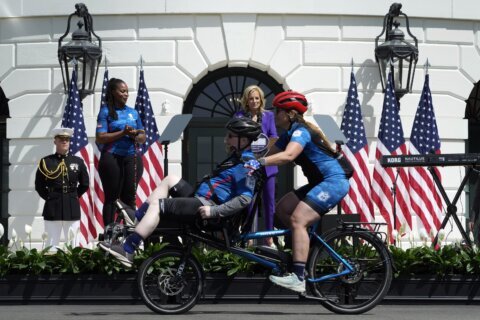COLUMBIA, Mo. (AP) — A Missouri university said Friday that an internal review has found allegations of improper care at a center for young transgender patients were “unsubstantiated,” after a former employee made claims of poor treatment — leading the state’s attorney general to investigate.
The former employee in February claimed Washington University Transgender Center is too quick to prescribe puberty blockers and hormones, does not do enough to educate parents and children before providing care, does not track negative side effects, and does not have adequate wraparound services for mental health care.
Washington University’s eight-week review found “allegations of substandard care causing adverse outcomes for patients at the Center are unsubstantiated,” according to a summary of the findings.
The former staffer’s allegations prompted Republican Attorney General Andrew Bailey, who was appointed in January and is running for election, to launch an investigation into the center. Since then, Bailey has expanded the investigation into all pediatric transgender health care in the state, including requesting records from a Planned Parenthood clinic about its policies on gender-affirming health care for minors.
Bailey last month opened a tip line, which his office in an earlier press release said is intended for “those who have experienced harm from gender transition interventions or witnessed troubling practices at transition clinics in Missouri” to submit concerns.
Bailey’s spokeswoman Madeline Sieren on Friday said in an email that “far left activists are trying to impede parents’ ability to shed light on what happened to their children” using the tip line. She did not provide additional information on that claim. She said the tip line is temporarily down “while we investigate these matters.”
Washington University’s internal review “identified no patients who had adverse physical reactions caused by medications prescribed by Center providers,” based on interviews with staff and medical records.
The center also requires a letter of support from a licensed mental health provider before prescribing puberty blockers or hormones, which the university says reflects “individualized review and assessment of patients” and their mental health.
“Records indicate most patients had ongoing relationships with mental health providers and the Center providers recommend resources to patients who may need ongoing treatment for mental health concerns,” according to the review summary.
Sieren in a statement said the “transgender center’s assertions don’t line up with what we’ve uncovered so far in our investigation.”
Washington University in a statement said it continues to cooperate with the attorney general’s investigation.
Katy Erker-Lynch, executive director of the Missouri LGBTQ+ rights group PROMO, said in a statement that she’s “unsurprised to hear all the standards of care are being followed at the Center.”
“We hear from parents every single day about the high quality of care given to them and their children,” she said.
Claims against the center have fueled Republican efforts to restrict or completely ban gender-affirming care in the state.
Bailey last week unveiled a first-of-its-kind emergency rule to impose numerous restrictions on both adults and children before they can receive puberty-blocking drugs, hormones or surgeries “for the purpose of transitioning gender.” The rule kicks in next week, although a court challenge is expected.
Republican state lawmakers have made it a priority to pass bills to bar any gender-affirming health care for minors, inmates and prisoners. Another high-priority bill would bar transgender girls from playing on girls sports teams in schools.
TransParent President Susan Halla said she doesn’t expect Washington University’s findings to stop what she called a “targeted attack on the transgender community.”
“They will continue on until they are able to pass laws against parents and how we parent our children,” Halla said.
A total of 1,165 people have gone to the center for treatment since June 2018, according to the university. That includes some informational phone calls “of sufficient depth to create a medical record.”
About half — 531 — received hormones, including “some who had existing prescriptions for these medications from unrelated physicians,” the university said. Another 67 received puberty blockers. The other patients were not prescribed either treatment.
Washington University surgeons provided six gender-affirming surgeries to minors before ending that practice. The Transgender Center stopped referring minors for gender-affirming surgeries elsewhere beginning in late 2018 but still gives patients the names of surgeons who provide that care upon request.
——-
Associated Press writer Margaret Stafford contributed to this report from Kansas City, Missouri.
Copyright © 2024 The Associated Press. All rights reserved. This material may not be published, broadcast, written or redistributed.







